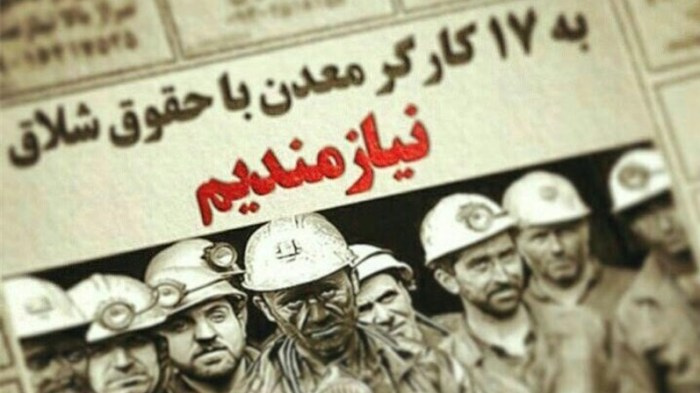Iranians Lash Out at Officials as Mineworkers Are Flogged

Outrage has been the dominant mood in the Iranian social media since the beginning of the week after the news broke out that 17 miners of Aq Darreh gold mine, Takab city, West Azerbaijan Province had been flogged following a complaint by owner of the gold mine.
The sentence is reported to have been executed in mid-May, though no exact date has been given. The verdict was issued last year by a criminal court in Takab but received modest media coverage then.
Pooya Zarkan, the company that owns the Aq Darreh gold mine in Takab, northwest of Iran, had decided to lay off 350 seasonal workers in winter of 2015. In response, the miners staged a sit-in inside mining facility which ultimately led to clash with security guards. The company filed a complaint against workers on various charges, including commotion. Besides the corporal punishment, workers were given months behind the bar and financial penalties, both of which were abolished after the plaintiff withdrew.
Principlist media blamed the government and its lackluster economic performance for the incident. Tasnim, affiliated with IRGC, called one-sided contracts the cause of such problems and reminded of similar protests staged by workers across the country in the recent months, criticizing the government for its inept attitude against such verdicts. The website quoted Faramarz Tofighi, labor affairs expert, who stated that flogging sentences have turned into a common punishment during the recent years.
Public outrage over the incident forced officials to respond and denounce the verdict. Alireza Mahjoub, Tehran MP and Secretary General of the Khaneh Kargar (Workers’ House), the most powerful workers’ syndicate in Iran, slammed the floggings in his Instagram account with a sarcastic advertisement that read “Needed: miners, salary paid in lashes.” Mahjoub demanded ministers of labor, interior and industry to be accountable for the incident. On Wednesday, June 1st, Jahanbakhsh Mohebbinia, the newly elected MP from Takab constituency, also slammed the sentence, calling it an “ugly”, “medieval” act and promising to pursue the case and bring the perpetrators to justice. Minister of Labor and Social Affairs, Ali Rabiei, who had intervened to stop execution of similar verdicts earlier, dismissed the top provincial director of the ministry in West Azerbaijan for being unaware of the execution of the verdict.
Although public anger did hold any specific office accountable, a Thursday interview published by Mizan, mouthpiece of the judiciary, showed how had to take the larger share of the criticism. The unapologetic, belligerent tone of Tavakkol Heydari, West Azerbaijan Province’s Chief Magistrate, stood in stark contrast to that of governmental officials. Speaking to Mizan, Heydari criticized all participants in the story for their conduct: Pooya Zarkan company for the adverse impact of its mining activities on agriculture and industry of the region, the workers for “rogue behavior” and undermining public order, and protestors to the execution of the flogging verdict for disturbing public peace. “In fact, the province’s judiciary has supported workers, employment, and production in this case” he said, arguing that the strike by angry workers had thrown a wrench in the works of the gold mine.
Amid deep economic recession, shutdown of factories, yawning class gap, and back-to-back disclosures of white-collar corruption cases, the news of such punishments for the weakest economic layers does not resonate well with the Iranian society. The lashes “have wounded not only the heart, but also the soul” of Iranian workers.
IRD/66

